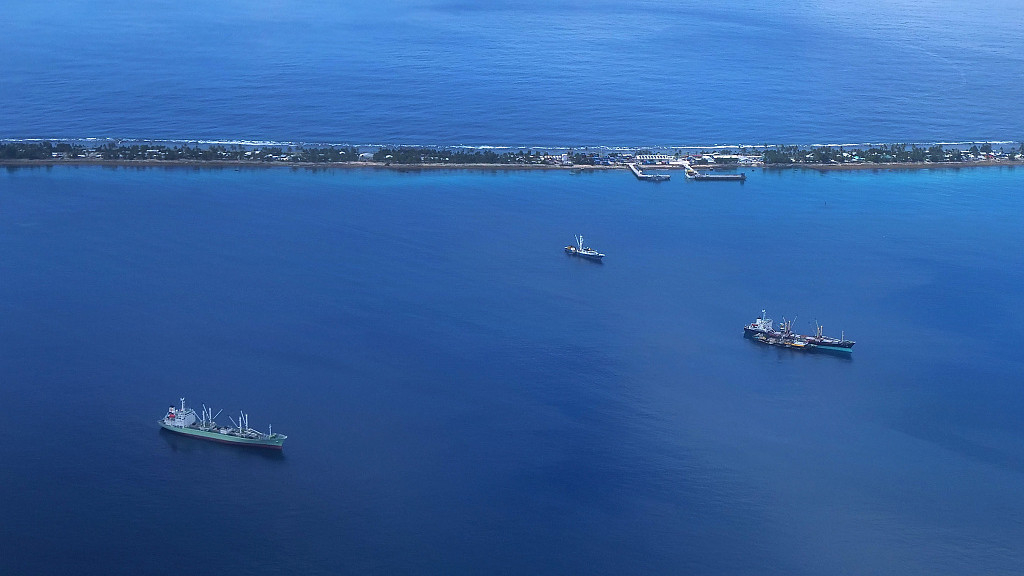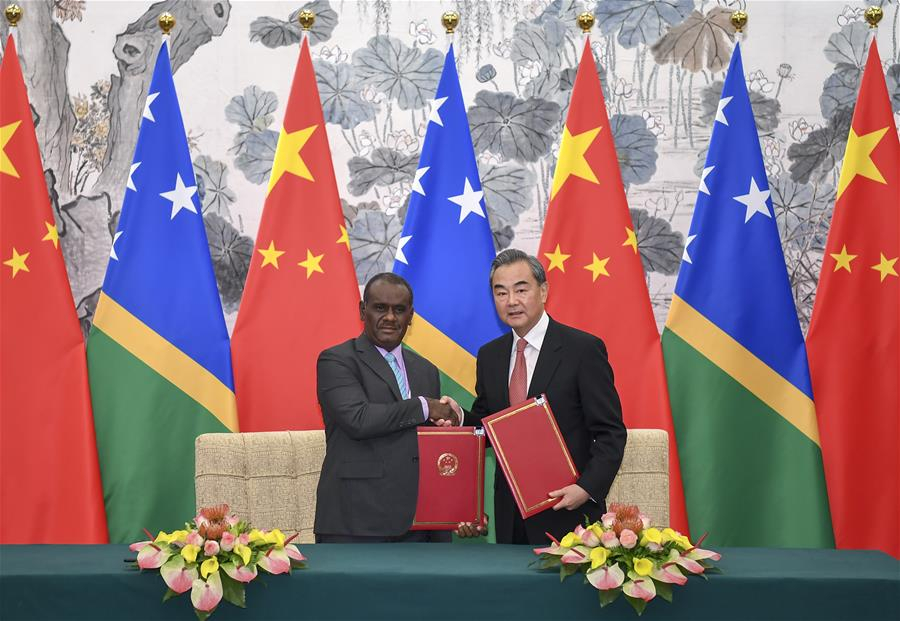
Foreign fishing vessels wait for their catch in Funafuti, Tuvalu. August 15, 2018. /VCG Photo
Foreign fishing vessels wait for their catch in Funafuti, Tuvalu. August 15, 2018. /VCG Photo
Editor's Note: Andrew Korybko is a Moscow-based American political analyst. The article reflects the author's opinion and not necessarily the views of CGTN.
The foreign minister of Tuvalu, Simon Kofe, was mistaken in his remarks about China to Reuters during an exclusive interview. He told the outlet that his country is teaming up with the three other South Pacific nations that still have "diplomatic" ties with Taiwan "to counter the influence" from the Chinese mainland.
Kofe also said that Tuvalu turned down an offer by Chinese companies to help it build artificial islands as part of his nation's response to the rising sea levels that threaten it.
He elaborated on the reasoning by adding, "We are hearing a lot of information about debt, China buying our islands and looking at setting up military bases in our part of the world. Those are things that are concerning to us." From his comments, it's clear that the foreign minister has fallen for the weaponized fake news narrative that has been spread about China.
American and Australian media have been the most active in propagating the story line that China is supposedly "luring" other countries into so-called "debt traps" and specifically doing so in the South Pacific region to later "seize" Chinese-constructed ports so that they can then be turned into naval bases. There is no factual basis whatsoever to those fearmongering claims, which deliberately misportray China's intentions in the region.
All that China has been doing is filling the development void left by Western countries that have hitherto neglected the mostly impoverished South Pacific island nations and thus created a demand for other states to step in. Some of them like the Solomon Islands and Kiribati used to "recognize" Taiwan, but then realized that they stand more to gain by switching recognition to Beijing instead.

Chinese State Councilor and Foreign Minister Wang Yi and Solomon Islands' Minister of Foreign Affairs and External Trade Jeremiah Manele sign a joint communique on the establishment of diplomatic relations in Beijing, China, September 21, 2019. /Xinhua Photo
Chinese State Councilor and Foreign Minister Wang Yi and Solomon Islands' Minister of Foreign Affairs and External Trade Jeremiah Manele sign a joint communique on the establishment of diplomatic relations in Beijing, China, September 21, 2019. /Xinhua Photo
China did not dangle any so-called "debt traps" in front of them to do so since that would be extremely counterintuitive. Neither of the two nations would have willingly decided to put themselves in such a position out of their own self-interest. So, their voluntary decision to recognize Beijing was made because they rightly believe that it would be better for their national interests in the long run. Their diplomatic reversals alarmed Taiwan's patrons, however, which then went into overdrive to ensure that no other countries followed them.
Tuvalu has regrettably fallen under the influence of those selfsame patrons and been tricked into believing that China supposedly constitutes a "threat" to the region. It certainly has the right to choose whichever development partners it likes, but that decision should have been based on market principles and the objective pursuit of national interests, not political factors such as unsubstantiated claims. The foreign minister's statements prove that the latter was at play.
His government and the other three in the region that have decided to "counter the influence" probably believe that they are going to get better deals from Taiwan and its patrons than they would from Beijing. Still, they would once again be mistaken if that is what's motivating them. Time and again, the U.S. and the other states that support Taiwan have proven that they are only interested in temporarily using other countries as leverage to serve their political and geostrategic benefits.
Tuvalu believes that is setting a positive example. But the one that it's actually sending is negative, and that is showing the world the strategic pitfalls of falling for fake news narratives.
(If you want to contribute and have specific expertise, please contact us at opinions@cgtn.com.)